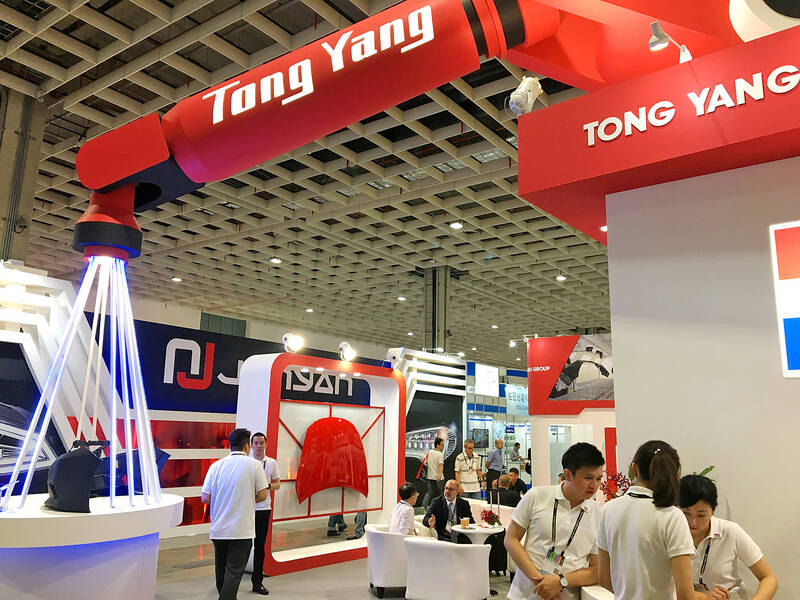The Tainan City Government has approved Tong Yang Industry Co’s (東陽實業) application to purchase a plot at Qigu Technology Industrial Park (七股科技工業區), the automotive metal sheet and bumper maker said yesterday.
The company plans to acquire the 15,105.16 ping (49,934.49m2) plot for NT$997.07 million (US$30.8 million) to construct a new plant to produce aftermarket auto components, Tong Yang said in a regulatory filing.
The deal comes after Tong Yang late last year purchased a 4,879.19 ping plot at Tainan Technology Industrial Park (台南科技工業區) for NT$595 million, as the company continues to expand its aftermarket business. It has undergone a steady recovery in the North American market since last year due to insurance companies expanding coverage to aftermarket collision parts such as fenders, grilles and metal plates.

Photo: CNA
Tong Yang, a leader in the global plastic parts and sheet metal parts aftermarkets with market shares of 70 percent and 35 percent respectively, said that orders have continued to grow, even as the industry enters a low season in the second quarter.
The company plans to speed up the construction of new production lines and manufacturing to meet its operational needs and market demand, it said.
Tong Yang supplies auto components for global brands through original equipment manufacturing (OEM) or the aftermarket channel.
The company has budgeted NT$4.2 billion for capital expenditure this year, it said.
The latest expansion would increase its bumper production capacity 5 percent, plastic front rail production capacity 33 percent and sheet metal fender production capacity 6 percent annually, Tong Yang said.
The company yesterday also released earnings results for the first quarter, with net profit soaring 139 percent year-on-year to NT$1.17 billion, a record high.
Earnings per share were NT$1.98, compared with NT$0.83 a year earlier, it said.
Cumulative sales in the first four months of the year rose 12.6 percent annually to NT$8.28 billion, the highest for the four-month period, as aftermarket sales increased 17 percent to NT$6.2 billion, while OEM sales edged up 1 percent to NT$2.08 billion, it said.

When an apartment comes up for rent in Germany’s big cities, hundreds of prospective tenants often queue down the street to view it, but the acute shortage of affordable housing is getting scant attention ahead of today’s snap general election. “Housing is one of the main problems for people, but nobody talks about it, nobody takes it seriously,” said Andreas Ibel, president of Build Europe, an association representing housing developers. Migration and the sluggish economy top the list of voters’ concerns, but analysts say housing policy fails to break through as returns on investment take time to register, making the

‘SILVER LINING’: Although the news caused TSMC to fall on the local market, an analyst said that as tariffs are not set to go into effect until April, there is still time for negotiations US President Donald Trump on Tuesday said that he would likely impose tariffs on semiconductor, automobile and pharmaceutical imports of about 25 percent, with an announcement coming as soon as April 2 in a move that would represent a dramatic widening of the US leader’s trade war. “I probably will tell you that on April 2, but it’ll be in the neighborhood of 25 percent,” Trump told reporters at his Mar-a-Lago club when asked about his plan for auto tariffs. Asked about similar levies on pharmaceutical drugs and semiconductors, the president said that “it’ll be 25 percent and higher, and it’ll

NOT TO WORRY: Some people are concerned funds might continue moving out of the country, but the central bank said financial account outflows are not unusual in Taiwan Taiwan’s outbound investments hit a new high last year due to investments made by contract chipmaker Taiwan Semiconductor Manufacturing Co (TSMC, 台積電) and other major manufacturers to boost global expansion, the central bank said on Thursday. The net increase in outbound investments last year reached a record US$21.05 billion, while the net increase in outbound investments by Taiwanese residents reached a record US$31.98 billion, central bank data showed. Chen Fei-wen (陳斐紋), deputy director of the central bank’s Department of Economic Research, said the increase was largely due to TSMC’s efforts to expand production in the US and Japan. Investments by Vanguard International

WARNING SHOT: The US president has threatened to impose 25 percent tariffs on all imported vehicles, and similar or higher duties on pharmaceuticals and semiconductors US President Donald Trump on Wednesday suggested that a trade deal with China was “possible” — a key target in the US leader’s tariffs policy. The US in 2020 had already agreed to “a great trade deal with China” and a new deal was “possible,” Trump said. Trump said he expected Chinese President Xi Jinping (習近平) to visit the US, without giving a timeline for his trip. Trump also said that he was talking to China about TikTok, as the US seeks to broker a sale of the popular app owned by Chinese firm ByteDance Ltd (字節跳動). Trump last week said that he had